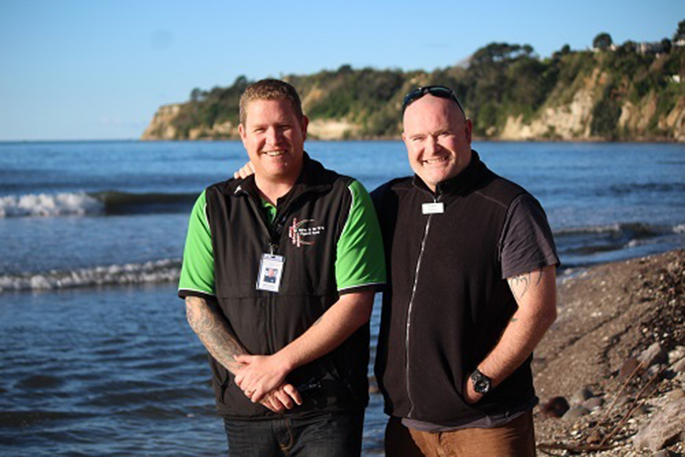Besides DNA, Bay of Plenty born and bred Morgyn and Mark Bramley have a lot in common.
The brothers, of Ngati Tuwharetoa, Te Arawa, Ngati Awa and Tainui descent, both live in Maketu, share a love of the ocean, and have two-year-olds who keep them on their toes.
Plus, both embarked on tertiary study as mature students into an area that is crying out for more males.
Mark graduated with a Bachelor of Social Work from the University of Waikato in Tauranga in 2012 - the same year big brother Morgyn started.
"Mark only had good things to say about the degree so I followed in his footsteps," says Morgyn.
Learning empathy from an early age influenced the brothers' decision to pursue a career helping others.
Mum and dad, Sally and Bill, ran a foster home in Rotorua so there were always extra kids to care for.
It took over 20 years for Morgyn and Mark to consider social work as a viable option to channel their empathy.
When they did it was with the realisation that, as Maori males, they would be a minority in demand.
From an initial intake of 55 in his year Morgyn says that number dwindled to just 15 and he was the only male to graduate.
"The drop off weeds out the people who can handle it from the ones who can't. You end up getting the safer people to do the job," says Morgyn.
Morgyn was still in his third year when he was offered a job with Rotorua's Stand Children's Services.
His role was to support kids attending 4-5 week camps designed to offer respite to either parents, kids or both.
The father-of-four had to balance work and study with family commitments, but the rewards made it worth the juggle.
"The mix of fun activities with workshops helped the kids cope with whatever they were dealing with: attachment issues, domestic violence, anxiety, grief, loss. Camp gave the kids a stable environment where they could learn to be kids again."
Recently shoulder-tapped for a role as whanau worker with Plunket, Morgyn now supports mums from their second trimester through until baby turns five.
"It's a privilege working with the whole whanau to make the best decisions together and to wrap the kid up in support", which beats the ‘ambulance at the bottom of the hill' approach he has witnessed in other areas of social work.
Mark's first job out of university, in adult mental health, was not such a positive experience.
A lack of support for the new graduate saw him burn out within eight months.
Taking three months out to recover provided a valuable insight early on in his career - recognise the warning signs and find a good work/life balance.
Fishing and surfing the beautiful East Coast keep both brothers connected to what's important - family and home.
With varied social work experience under their belts, Morgyn and Mark have identified gaps in the system they reckon have some "real simple fixes". Like teaching kids to surf.
They believe that taking a kid out of a dysfunctional or at-risk environment and plunging them into one where they have to rely on someone else gives many something they've never had.
If Mark had his way, surf programmes would be implemented for youth across the Bay and beyond.
"Some of the best outcomes are from programmes. You try telling a father of five with the youngest still at home to take a parenting course and you'll get knocked out.
"But take a kid who is struggling out of their world and bring them into my world where they have to rely on me and the relationship is built very quickly."
Morgyn nods in agreement.
"It's a real personal achievement when they learn to stand up on a surfboard. It builds self-esteem that stays with them well past the wave."
Mark now works for Te Tohu O Te Ora O Ngati Awa as a Social Workers in Schools (SWIS) team leader and enjoys his role working with school-aged kids in the Whakatane area. Both brothers recognise the need for a "social work lens" in management roles, so they are planning a return to study. Mark has already checked out their options on the Waikato website.
As he says, "There's a need for that field work experience. People who understand what the whanau, and the social workers, are going through. A pure business degree won't teach you that. It's not just checks and balances, it's about people."



0 comments
Leave a Comment
You must be logged in to make a comment.